Biomass Pellet and Briquette
- The process of biomass pellet generation is different from the briquette.
- Pellets used for cooking are generated after drying and compressing the biomass powder derived from wood, agricultural waste etc. Briquettes are used similar but not pulverized like biomass powder in pellet making machines as presented in the post. Hence biomass pellet is expensive compared to biomass briquette.
Advantages of Pellet over Briquette
- Biomass pellet is widely used in paper mills and sugar factory. Various machines are used to produce the pellets.
- For a biomass stove, pellets are generally considered to be the better option for several reasons:
High Energy Efficiency
- Pellets have a higher energy density compared to briquettes.
- Due to their uniform shape and size, they can be packed more tightly, resulting in a more efficient burn and higher heat output. This means that you will need fewer pellets to generate the same amount of heat compared to briquettes.
Consistent Quality
- Pellets are manufactured under controlled conditions, ensuring consistent quality and moisture content.
- This consistency leads to more reliable and predictable burning characteristics, reducing the risk of stove malfunctions or inefficient combustion.
Cleaner Burning
- Pellets typically produce less ash and smoke during combustion compared to briquettes.
- The lower ash content means less frequent cleaning of the stove and chimney, while reduced smoke emission results in a more environmentally friendly option.
Ease of Handling and Storage
- Pellets’ uniform shape and size make them easy to handle, store, and feed into the stove.
- They can be easily transported in bags or stored in bulk, whereas briquettes, with their irregular shapes, might be more challenging to handle efficiently.
Wider Availability
- In many regions, especially where biomass stoves are popular, pellets tend to be more readily available compared to briquettes.
- This availability ensures a steady fuel supply for your stove.
Reduced Moisture Content:
- Pellets generally have lower moisture content compared to briquettes.
- Lower moisture content leads to more efficient burning and less energy loss through the evaporation of excess water during combustion.
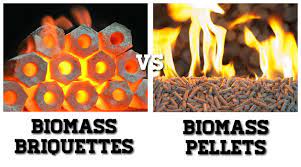
Easier Ignition
- The uniformity and compactness of pellets facilitate easier ignition compared to briquettes, which might require additional effort to get them to burn efficiently.
- It’s worth noting that both briquettes and pellets can be used in biomass stoves, and the best choice may vary depending on your specific situation and location.
- If briquettes are more readily available or cost-effective in your area, they can still be a viable option.
- However, if you have access to both and are looking for optimal performance and convenience, pellets are generally the preferred choice.
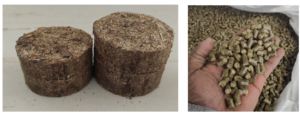
The Disadvantage of Pellet over Briquette
High Power consumption
- Pelleting incurs huge electricity bills
- for example, the Electricity Cost/tonne For Briquettes would be around Rs. 300/-, whereas else for pellets it could be Rs. 1000/-
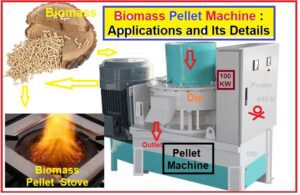
High Capital cost
- Production cost (labor, spared & tools, maintenance) of briquettes could be Rs. 1000/- per tonne. But for pelleting it would come to almost 2000/- per tonne.
- The production capacity (Per hour) of pellets is much lesser compared to Briquettes.
- Pelleting will incur huge Capital Expenditure. And working capital too, is not small. Your investment ratio of pellet: briquette Could be 3:1
Low Consumer Market
- Pellet buyers are very few.
- These are companies that are quality conscious and take very good care of their boilers, furnace, etc. Whereelse, briquette buyers are lot more than pellet buyers, because major industries (In India) cost concerned.
Low Moisture Required
- For pelleting, the moisture should be at least below 7–8%.
- High moisture biomass needs more drying cost
- The dryer needs to be run day and night for moisture removal from the biomass raw materials
- But the briquettes can be made from high moisture (15% -20%)
- Most of the biomass from forest or agriculture waste is in the range of 15–20%.
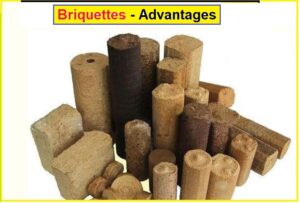
Advantages of Briquette over Pellet
- The formation of a briquette is given in the previous post.
- Biomass briquette is generated after compressing the wood, agriculture waste, and charcoal etc. But the amount of pressure or electricity used is less compared to pellet making machine.
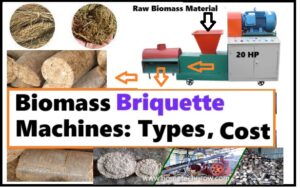
Lower Cost
- In some regions, the production cost of briquettes may be lower than that of pellets.
- This can make briquettes a more cost-effective option, especially in areas with abundant raw materials for briquette production.
The Versatility of Raw Materials:
- Briquettes can be made from a wide range of biomass materials, including sawdust, wood chips, agricultural residues, charcoal dust, and more.
- This versatility allows for the utilization of various locally available biomass feedstocks.
Ease of Storage and Handling:
- While pellets are generally more uniform and easier to handle, briquettes are still relatively easy to store and transport compared to loose biomass materials.
- Their compact shape makes them stackable, reducing storage space requirements.
Lower Dust and Fines:
- Briquettes, due to their denser and more solid structure, may produce fewer fines (fine particles) and dust during storage and transportation compared to pellets.
Lower Ash Content:
- Some types of briquettes can have lower ash content compared to certain pellet types. This can lead to less frequent cleaning of the stove or boiler.
No Specialized Equipment Needed:
- While pellet stoves often require specific equipment, such as pellet feeders, briquettes can be used in traditional biomass stoves without any modifications.
Customization:
- The shape and size of briquettes can be customized based on specific requirements, which may be advantageous in certain industrial applications.
- Slow burning is good for domestic cooking
Slow Burning:
- Briquettes can burn more slowly than pellets, which might be beneficial in situations where longer-lasting and consistent heat output is required.
Lower Water Absorption:
- Briquettes typically absorb less moisture from the atmosphere compared to pellets, ensuring better storage stability in humid environments.
Summary
- It’s important to note that the advantages of briquettes over pellets may vary depending on factors such as regional availability, cost, stove design, and specific application needs.
- Both briquettes and pellets have their merits, and the choice between the two depends on the individual circumstances and priorities of the user.
